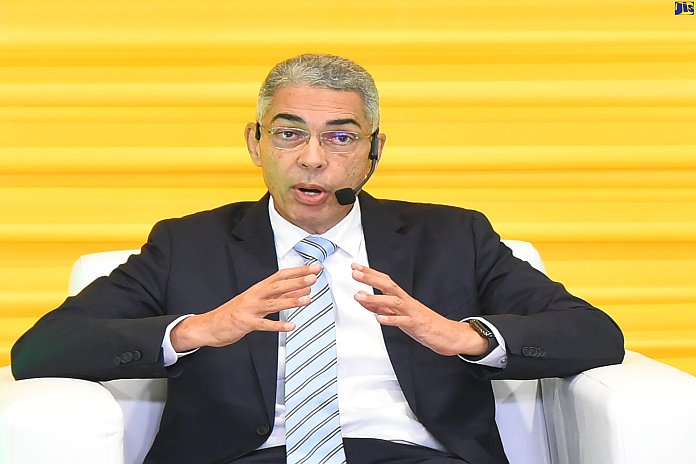By Douglas McIntosh
KINGSTON, Jamaica, (JIS) – The Bank of Jamaica (BOJ) is encouraged by the declining out-turns recorded in the last three Consumer Price Index (CPI) reports, Governor, Richard Byles, has said.
The CPI, which measures variations (inflationary movements) in commodity prices for consumers, is administered by the Statistical Institute of Jamaica (STATIN).
Byles noted that having peaked at 11.8 percent in April 2022, the rate of inflation fell to 10.9 percent in May and June, and to 10.2 percent in July.
“Declining international commodity prices, relative stability in the exchange rate, tighter liquidity management by the BOJ, and higher interest rates have allowed for this trend,” the Governor informed.
He was speaking during the Bank’s digital quarterly media briefing on Friday, August 19.
Byles said notwithstanding this “good trend”, the BOJ believes these conditions have not sufficiently solidified to ensure that inflation is sustainably placed on a downward path towards the institution’s four to six per cent target range, adding that “there remains some significant risks of reversal”.
He emphasised that the fragile geopolitical conflict between Russia and Ukraine, and Europe’s knock-on commodity price risks “cannot be ignored”.
Additionally, Byles said reported labour shortages in several sectors of the economy and pressures from recent local inflation experiences “carry the potential for future wage adjustments that could be inflationary”.
Further, the Governor said high inflation in the United States and other trading partners has prompted a programme of faster monetary adjustment, noting that this could cause capital outflows from Jamaica and exchange rate depreciation, “if domestic monetary policy is not properly aligned”.
“These are some of the factors the bank’s Monetary Policy Committee (MPC) considered when it met on August 16 and 17, 2022, and voted to increase the policy rate [on deposit-taking institutions’ (DTIs) overnight balances] by a further 50 basis points to six per cent, effective August 19, 2022,” he told journalists.
Byles informed that the Committee also decided to continue pursuing other measures to contain Jamaican dollar liquidity expansion and maintain relative foreign exchange market stability. He said the MPC noted that the Bank’s strong international reserves reinforce its ability to support the foreign exchange market, as needed.
“This current decision has resulted in a cumulative increase in the policy rate of 550 basis points since October 2021 and has taken the policy rate to a level that the Committee considers appropriate,” Byles pointed out.
He added that if incoming data on inflation continues to track downwards, and the monetary adjustments in the US, in particular, are as expected, “the MPC agreed that it could pause its policy rate increases”.
Byles advised that the policy rate increases were complemented by the Bank’s adjusting the Net Open Position limits for DTIs, and selling approximately US$678 million to the foreign exchange market, since October 2021. This, he said, was approximately 30 percent more than the sum sold over the corresponding period to July 2021.
He also indicated that the Bank bought US$1.96 billion over the same period, primarily through the surrender system. Byles said these policy actions contributed to the exchange rate being stabilised since the start of November last year.
“Without these actions, imported inflation, and hence the final prices faced by consumers, would have been much higher,” he further stated.
Byles said the BOJ anticipates that these measures will continue to cause interest rates on deposits to further increase, thereby making savings in Jamaican dollars more attractive, relative to foreign currency assets.





